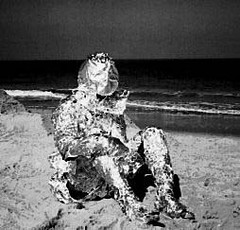My Rehoboth Beach Visit Was Too Short!
We drove back to Woodbury, New Jersey Sunday evening because both Adam and Stephen had to work on Monday. The shore traffic was a mess, but I knew it would be. Back in the fifties and sixties of the last century I often drove Rebecca and the children to Rehoboth Beach for a long weekend during the summer. We rented a cottage there (one that no longer exists) for several years. In fact, with the new turnpike in place, it was much better this time than back in the old days. Back then Rt. One went through every small town and we often had to stop at every traffic light between Christiana and Rehoboth Beach, thirty-seven according to my count. This past Sunday it took us three hours in heavy traffic, compared with four and one half hours back when I made the drive regularly every summer.
Monday, August 28, 2006 - What the Bible Doesn’t Say about Homosexuality

Sunday, August 27, 2006
Once I was ensconced in Adam’s apartment in Woodbury, and Adam had left for work, I returned to my book, What the Bible Really Says About Homosexuality, by Daniel A. Helminiak, Ph.D.. Dr. Helminiak seems to be making the claim that the Bible doesn’t talk about homosexuals as a type of human being, since there wasn’t a word for that type of man or woman at the time. However, he doesn’t say that in so many words. Instead he proceeds to examine the standard texts used by prejudiced Christians to make their case against homosexuals in minute detail, describing the Hebrew state practices, and cultural institutions of the time, and the ways these did or did not address same sex behaviors. He describes this as an historical religious approach as opposed to a literal religious approach to the Bible. I found myself thinking that both of these approaches are interpretations of the Bible, and that neither allows much room for the reader to approach the Bible with the goal to understand it from a unique perspective.
Looking at the old testament, Dr. Helminiak states that same sex behaviors were understood as unclean by the ancient Hebrew texts, but makes several distinctions between the Bible’s statements about same sex behaviors and the claim that the Bible says homosexuals are evil, bad, unacceptable, and so forth. For instance, in the story of Sodom he states that the term “abomination” does not refer to sex acts at all, but to “idolatry, to Israel’s infidelity to God, and to Child Sacrifice and murder.”*1 He then goes on to say, and I’m loosely paraphrasing that religious parents who disown or punish their gay child are guilty of the very sin the story of Sodom is addressing.
Dr. Helminiak continues to write in that vein, analyzing every part of the Bible in which many Christians claim to find statements that support their prejudice against lesbian and gay people. Unfortunately some of the labyrinthine explorations of ancient languages, etymology, and conflicting social customs, of ancient Hebrew, Greek, and Roman cultures become so abstruse as to prevent most people (though perfectly capable) from bothering to follow through to Dr. Helminiak's conclusion as stated above. I am not disparaging the text, rather the obvious lack of will to read for subtlety of understanding in our culture. Most of us subscribe to the Western Cartesian proclivity for opposites. Something is or it is not, it is black versus white, male versus female, Christian versus Jew, heterosexual versus homosexual, Republican versus Democrat, East versus West. If it is not an opposition, it can’t be dealt with in any logical fashion. Thus, the explorations of subtle meaning in Doctor Helminiak's book will be too difficult for those in most need of correction to bother with.
Upon finishing What the Bible Really Says About Homosexuality, I couldn't help thinking that those who use the Bible to support their own prejudice superimpose their negative view of the world upon the holy book, and perform the worst disservice to God's word.
*1 Helminiak, Daniel A. Ph.D., What the Bible Really Says About Homosexuality, Tajique Alamo Square Press (Millennium edition, 2000), p.48.
You can send E-mail comments to
Monday, August 28, 2006 - What the Bible Doesn’t Say about Homosexuality

Sunday, August 27, 2006
Once I was ensconced in Adam’s apartment in Woodbury, and Adam had left for work, I returned to my book, What the Bible Really Says About Homosexuality, by Daniel A. Helminiak, Ph.D.. Dr. Helminiak seems to be making the claim that the Bible doesn’t talk about homosexuals as a type of human being, since there wasn’t a word for that type of man or woman at the time. However, he doesn’t say that in so many words. Instead he proceeds to examine the standard texts used by prejudiced Christians to make their case against homosexuals in minute detail, describing the Hebrew state practices, and cultural institutions of the time, and the ways these did or did not address same sex behaviors. He describes this as an historical religious approach as opposed to a literal religious approach to the Bible. I found myself thinking that both of these approaches are interpretations of the Bible, and that neither allows much room for the reader to approach the Bible with the goal to understand it from a unique perspective.
Looking at the old testament, Dr. Helminiak states that same sex behaviors were understood as unclean by the ancient Hebrew texts, but makes several distinctions between the Bible’s statements about same sex behaviors and the claim that the Bible says homosexuals are evil, bad, unacceptable, and so forth. For instance, in the story of Sodom he states that the term “abomination” does not refer to sex acts at all, but to “idolatry, to Israel’s infidelity to God, and to Child Sacrifice and murder.”*1 He then goes on to say, and I’m loosely paraphrasing that religious parents who disown or punish their gay child are guilty of the very sin the story of Sodom is addressing.
Dr. Helminiak continues to write in that vein, analyzing every part of the Bible in which many Christians claim to find statements that support their prejudice against lesbian and gay people. Unfortunately some of the labyrinthine explorations of ancient languages, etymology, and conflicting social customs, of ancient Hebrew, Greek, and Roman cultures become so abstruse as to prevent most people (though perfectly capable) from bothering to follow through to Dr. Helminiak's conclusion as stated above. I am not disparaging the text, rather the obvious lack of will to read for subtlety of understanding in our culture. Most of us subscribe to the Western Cartesian proclivity for opposites. Something is or it is not, it is black versus white, male versus female, Christian versus Jew, heterosexual versus homosexual, Republican versus Democrat, East versus West. If it is not an opposition, it can’t be dealt with in any logical fashion. Thus, the explorations of subtle meaning in Doctor Helminiak's book will be too difficult for those in most need of correction to bother with.
Upon finishing What the Bible Really Says About Homosexuality, I couldn't help thinking that those who use the Bible to support their own prejudice superimpose their negative view of the world upon the holy book, and perform the worst disservice to God's word.
*1 Helminiak, Daniel A. Ph.D., What the Bible Really Says About Homosexuality, Tajique Alamo Square Press (Millennium edition, 2000), p.48.
You can send E-mail comments to



0 Comments:
Post a Comment
<< Home